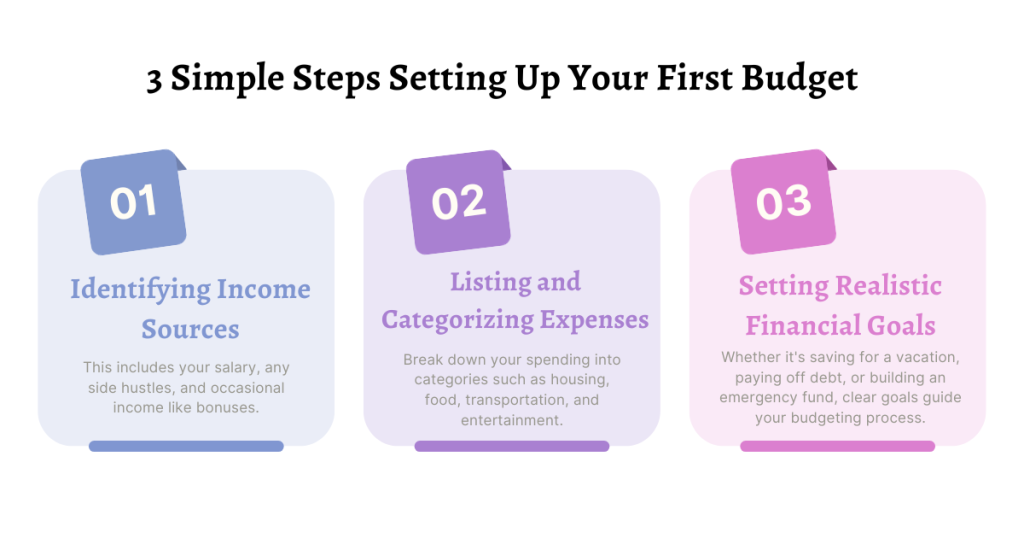Introduction to Budgeting for Beginners
Budgeting, at its core, is about understanding and managing your financial resources. It’s a method to visualize your income and expenses, ensuring that you spend less than you earn. The importance of budgeting cannot be overstated; it’s essential for achieving financial stability and preparing for future goals. However, there are common misconceptions about budgeting, such as it being overly restrictive or only for those struggling financially. In reality, budgeting is a powerful tool for everyone, providing clarity and control over one’s financial life.
Table of Contents
Setting Up Your First Budget

Creating your first budget involves a few key steps:
- Identifying Income Sources: This includes your salary, any side hustles, and occasional income like bonuses.
- Listing and Categorizing Expenses: Break down your spending into categories such as housing, food, transportation, and entertainment.
- Setting Realistic Financial Goals: Whether it’s saving for a vacation, paying off debt, or building an emergency fund, clear goals guide your budgeting process.
A well-structured budget aligns your spending habits with your financial goals, paving the way for a more secure financial future.
Budgeting Methods Explained
There are several budgeting methods to consider when starting budgeting for beginners:
- Zero-Based Budgeting: This approach involves assigning every dollar of your income to specific expenses, savings, or debt payments, ensuring no money is left unallocated.
- The 50/30/20 Rule: Popularized by Senator Elizabeth Warren, this rule suggests spending 50% of your income on needs, 30% on wants, and 20% on savings or debt repayment. Learn more about budgeting on Investopedia.
- Envelope System: A cash-based budgeting method where you allocate cash for different spending categories in separate envelopes, helping to curb overspending.
Each method has its merits, and the best choice depends on your personal financial situation and preferences.
Suggestions | Read Now : Saving Money on Everyday Expenses: Top 10 Simple Hacks for 2024
Tracking and Managing Your Budget
Maintaining your budget requires regular tracking and management:
- Tools and Apps for Budget Tracking: Utilize budgeting apps like Mint or YNAB to keep track of your spending and savings goals. These tools can provide valuable insights into your financial habits.
- Tips for Staying on Track: Regularly review your budget, adjust as needed for unexpected expenses, and stay disciplined with your spending. Celebrate small victories when you meet your budgeting goals to stay motivated.
Effective budget management is not just about tracking; it’s about adapting and evolving your budget to fit your changing financial landscape. Calculate your budget with NerdWallet’s tool to get a clearer picture of your financial standing.
Advanced Budgeting Strategies and FAQs
Saving and Investing with a Budget
Creating a budget is not just about managing expenses; it’s also about paving the way for future financial security. Here are key aspects to consider:
- Importance of an Emergency Fund: An emergency fund acts as a financial safety net for unexpected expenses, such as medical emergencies or sudden job loss. Aim to save at least three to six months’ worth of living expenses.
- Basic Investment Strategies for Beginners: Once you have your emergency fund, consider investing to grow your wealth. Start with low-risk options like mutual funds or index funds, and gradually diversify your portfolio.
Common Budgeting Pitfalls and How to Avoid Them
Even the best budget can be undermined by common pitfalls:
- Overspending in Certain Categories: Track your spending closely to avoid going over budget in areas like dining out or entertainment.
- Forgetting Irregular Expenses: Annual or semi-annual expenses like insurance premiums or car maintenance can disrupt your budget if not planned for. Include these in your monthly budget by dividing their total cost by 12.
7. Adjusting Your Budget Over Time
when start budgeting for beginners Your budget should evolve as your life changes:
- When and How to Review Your Budget: Regularly review your budget, ideally monthly, to ensure it aligns with your current financial situation.
- Adapting to Life Changes: Major life events like a new job, marriage, or having a child will necessitate budget adjustments. Be proactive in modifying your budget to accommodate these changes.
8. FAQs Section
- How should a beginner start a budget?
Begin by tracking your income and expenses. Use tools like NerdWallet’s Budget Calculator to understand your financial flow and set realistic goals. - What are the rules for budgeting for beginners?
Start simple. Prioritize essential expenses, set clear financial goals, and track your spending regularly. Adjust as needed to stay on track. - What are the 50-30-20 budgeting rules?
Allocate 50% of your income to needs, 30% to wants, and 20% to savings or debt repayment. This rule helps balance essential spending with financial goals. Explore Mint’s budgeting tips for more insights.
What is a good first step when budgeting?
The first step is to gather financial statements and track where your money currently goes. This includes bills, receipts, and bank statements to get a complete picture of your spending habits.




